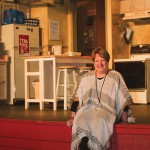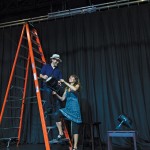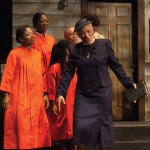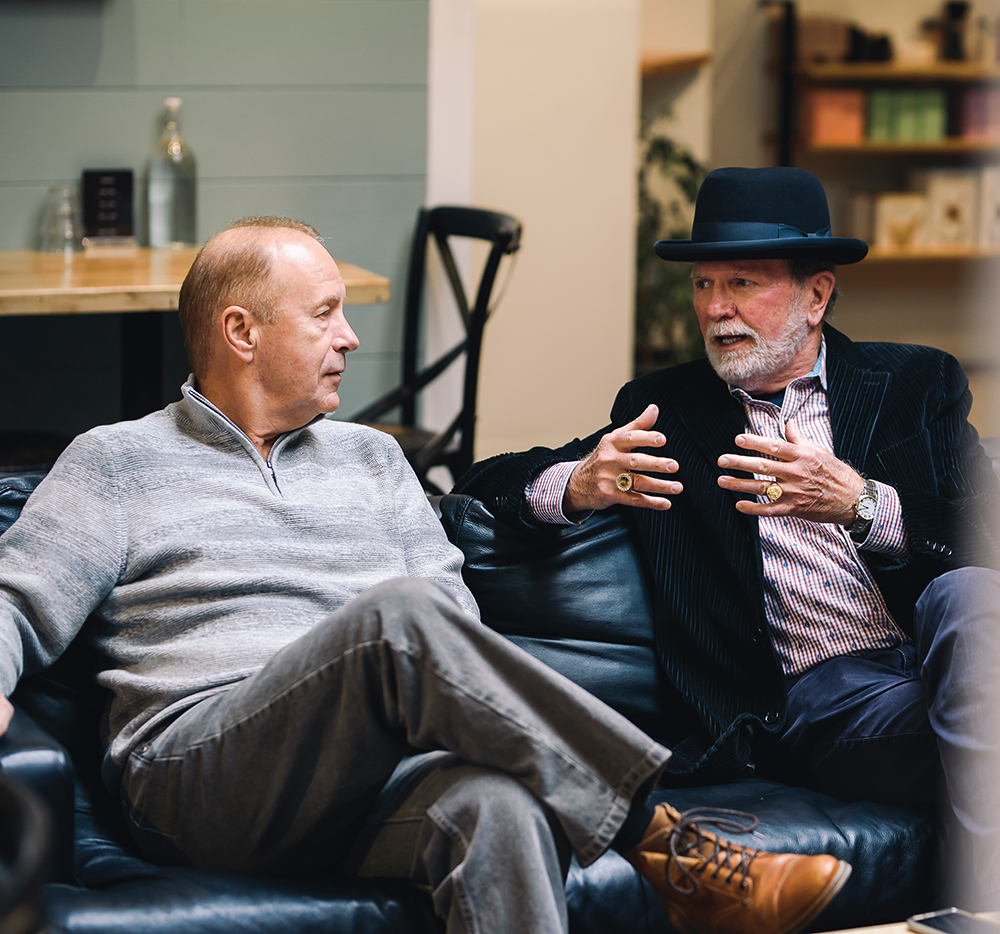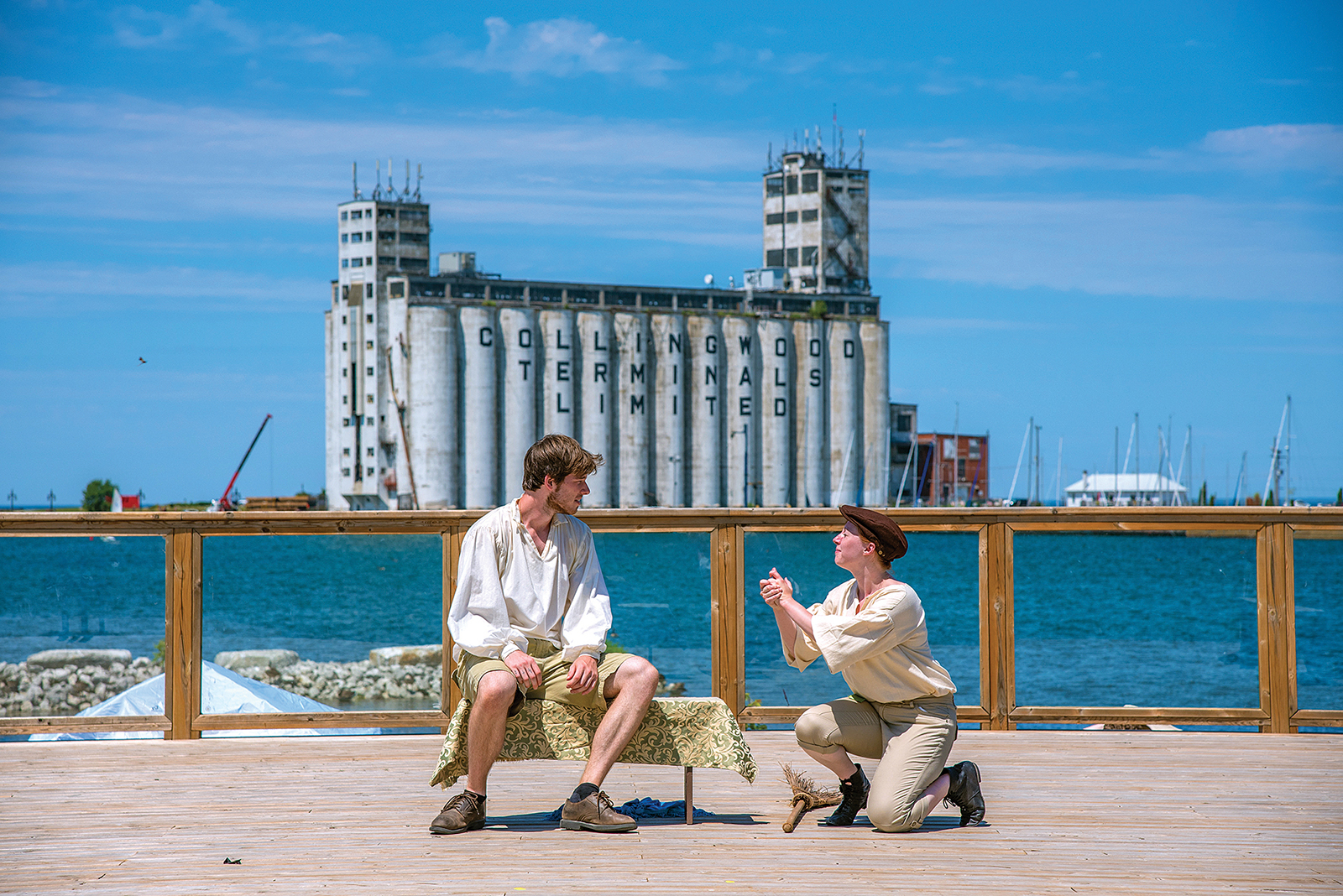Local theatre has undergone an evolution in Southern Georgian Bay
story by Judy Ross
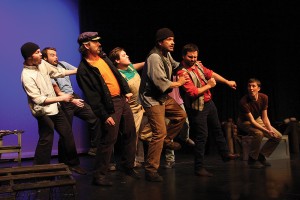
“I regard the theatre as the greatest of all art forms, the most immediate way in which a human being can share with another the sense of what it is to be a human being.” ~ Oscar Wilde
The amazing thing about live theatre in small communities like ours is that it exists in any form at all. With intense competition for our leisure-time viewing (live streaming, Netflix, movies, addictive TV series, etc.) and top-rated professional theatre just a few hours away in Toronto, Niagara-on-the-Lake and Stratford, filling a 357-seat theatre in Collingwood for a live performance is no mean feat.
“It’s always a challenge,” acknowledges Erica Angus, who took on the role of Theatre Collingwood’s executive director in 2013, “but Theatre Collingwood has now been around for 32 years. It has gone through many phases and changes but somehow managed to survive.”
The most recent change, and part of Angus’s mandate when she took the job, is the conversion from a “producing” theatre to a “presenting” theatre. Essentially it was far too costly to mount original professional productions. Now Angus’s job is to search out productions that are on stage in other small towns and bring them to Collingwood. Unlike community theatres where the actors are unpaid amateurs, Theatre Collingwood is a not-for-profit “professional” company, meaning the actors, directors, stage managers and lighting directors all get paid.
“We offer a high level of professionalism,” says Angus, “and this becomes expensive. I have always been involved with professional theatre because I feel when people put time and effort into a profession they should be paid. We have an annual budget of $350,000 and only half of that comes from ticket sales; the rest is raised through fund-raising events and donor support.”
During the summer season, which runs from May to September, five different plays are presented, each with a six-day run. The playbill typically consists of light-hearted musicals and comedies, the belief being that patrons don’t want to come to something “dark” in the summer season. Angus’s challenge is to find plays that fill this dictate.
“It’s a part of my job that I love,” she enthuses. “I get to travel all over Ontario and look for material. I work with theatre companies in Orangeville, Gravenhurst and Port Dover, for instance. It’s a great arrangement because when we do a joint venture we get to share the production costs; the actors get longer contracts, which is good for them; and we are open to a much bigger pool in terms of the plays we can bring here.”
Although theatre companies can and do mount plays in tents (as in the early days of Stratford) or under the stars (in Central Park, New York), at some point the benefit of a dedicated building becomes paramount. For years Theatre Collingwood scrambled to find performing space in school auditoriums. Uncomfortable seats, poor acoustics and bad sightlines (not to mention some questionable productions) were a true test for loyal patrons in those days. Then, in 2003, local entrepreneurs Sid Dickinson and Kathie Houghton decided to buy the Gayety Theatre building, in part to give the company a home.
“I knew that Theatre Collingwood had been trying for years to have a real performance space,” recalls Dickinson, “and I thought this could be a hub for entertainment in downtown Collingwood.”
The building, now referred to as The Historic Gayety, has been a solid red brick presence on the corner of Hurontario and Ontario streets since 1922 when it opened as the Rex Theatre, presenting live vaudeville acts and silent films. The name change took place in 1929 when the owner at the time bought the “Gayety” marquee from a bankrupt burlesque house in Toronto and had it shipped to Collingwood by train.
Those who remember say the Gayety marquee was a dazzling sight, rising way above the building and ablaze with 1,500 light bulbs. When the building was renovated in 1949 the jazzy marquee was hauled off to the dump (too many light bulbs to replace, according to the owners) and the building became a cinema, the first theatre north of Toronto to show ‘talking’ movies. It continued to operate as a cinema until taken over by Houghton and Dickinson.
The building’s interior needed “a substantial investment,” according to Dickinson, to make it usable for live theatre and entertainment; things like a state-of-the-art sound system, theatrical lighting, a sprung stage with ample wings on both sides, and comfortable staggered seating. In 2004 a doorway was opened into the adjoining Blue Mountain Foundation for the Arts building, which serves as a lobby for the theatre.
Today the historic theatre is run by Dickinson as a rental space and on one out of every four nights “something is going on at the Gayety,” and it’s not always Theatre Collingwood. As Erica Angus points out, “We are not the only tenants. Many other events and productions take place in the theatre and this sometimes causes confusion.”
In order to keep patron awareness high, Theatre Collingwood mounts a series of one-night-only shows that kicks off every February with a live original production, “The Valentine Cabaret,” a love-themed performance that brings in star performers from big-name hit shows. It sells out every year.
Just a few blocks away from the Historic Gayety is the charmingly intimate Simcoe Street Theatre housed in the former Enterprise-Bulletin newspaper headquarters. The building, which dates back to the 1980s, has been owned since 2010 by Richard and Anke Lex, the energetic couple responsible for much of the building restoration and revival – both architectural and cultural – taking place in that neighbourhood. Known as a black box theatre – meaning a basic, bare-bones space with black walls – the 100-seat theatre is small but has surprisingly plush seats, rescued from a Toronto Cineplex. There’s also an attached pressroom and reception area that doubles as an art gallery.
“When Rick and I took over the building we felt that the newspaper’s warehouse and mail room were just calling out to be a theatre,” explains Anke, “and we believed there was a need in Collingwood for an affordable, flexible space for creative performances.”
The couple’s instincts were right. Since the Simcoe Street Theatre officially opened on May 1, 2015, there has been something on stage an average of three or four nights a week. The productions range from speakers to musicians, from indie artists to one-person shows, from author readings to experimental theatre … and the theatre now has a screen for showing documentary films as well.
Although new to theatre, the Lexes have jumped right in and, in some cases, become involved as co-producers. “We still have much to learn,” notes Anke, who is loving this new aspect of her already busy life, “but people help us along. It’s quite magical what happens on that little stage. And we find that all the performers love coming here. They love the audiences, the town – and they all want to come back. So we must be doing something right.”
There is an old theatrical adage that once the theatre gets in your blood it stays there forever. The story of how the Meaford Community Theatre came to be is a case in point. Wayne Bryant, the president of the amateur group, had his first experience on stage up in Yellowknife where he owned an engineering company. His wife, who was on the board of the Arts and Culture Centre there, got him a role in their production of Music Man.
“I had just retired and she wanted something for me to do,” recalls Bryant with a chuckle. “I had no experience, nor even any interest in theatre at the time. But that experience changed my life! Being on that stage, hearing that applause … I fell in love with theatre and I’ve wanted to be on the stage ever since!”
Bryant and his wife chose Meaford as the ideal place for their retirement. The town had a thriving theatre company (The Georgian Theatre Festival) and a historic Opera House, Meaford Hall, with a 310-seat theatre, which was undergoing a massive restoration at the time. It seemed a perfect choice for the retired couple with thespian ambitions. But sadly, what the Bryants didn’t know was that a battle had erupted between the theatre company, the management of the renovated building and some members of the town council over the newly restored space. Political infighting ensued and in the end, the theatre company was banned from Meaford Hall. The Georgian Theatre Festival struggled on for a couple of years using other venues (including tents), but was eventually unable to survive without a permanent home.
Bryant admits that it was a very messy situation, but he and others, including deputy mayor and playwright Harley Greenfield, were determined to keep theatre alive in their small town. They started the Meaford Community Theatre in 2009 with a group of amateur enthusiasts and their first production, Harvest Moon by local playwright Greg Brown, played to nearly full houses in Meaford Hall for three nights and one matinée. Since then they’ve had several successes and one “bummer,” admits Bryant, but with avid support from the local community, their amateur theatre company continues to be a vibrant addition to the cultural life in Meaford.
“Basically it’s all about having fun,” says Bryant. “We’re not getting paid, but we’re getting a great deal of personal satisfaction and fond memories that will last a lifetime.”
Further proof of live theatre’s allure for both participants and audiences is the phenomenal success of Gaslight Community Theatre Productions in Collingwood. This grassroots theatre group has put on a series of sell-out performances every November for the past six years. The format involves four 20-minute plays performed by local amateurs and mounted in different venues in the downtown core.
Small audience groups gather first in the Collingwood Public Library, where they get an official greeting from the Town Crier. They are then escorted from one venue to another with the help of costumed Gaslight guides who impart historical information (and sometimes juicy gossip) during the walk. The theme changes every year to showcase a different aspect of Collingwood’s history.
The founder and artistic director of Gaslight, Arlene Noble, left Collingwood early this year to move to Toronto, which was a shock to her many followers and Gaslight fans. But “she left a great template and a great team of volunteers,” says Monica Wilson, who was hand picked by Noble to take over as Gaslight’s executive producer. Wilson had been involved in every capacity of the productions from the very first year, and although she is filling some very big shoes, she says confidently,“There’s not much I don’t know about Gaslight, and I’m sure we will continue to be a success.”
Not only is the Gaslight Tour a sell-out success, it also raises funds to support arts activities in the community and promotes the art of playwriting among local residents.
One of the initiatives, Page to Stage, brings together a group of 12 amateurs interested in writing for theatre. The biggest draw for this five-night course in scene writing, which takes place in February and March, is its teacher: Canada’s famous playwright and local resident Dan Needles.
Best known for the popular Wingfield series, which has played on stages across Canada since 1984, Needles is typically sardonic about his new teaching role. “The first year I was trying to sum up everything I know,” he quips, “and then I found it all fit on one page.”
Now after four years he finds the students’ writing gets better every year. At the end of the series the group selects four scenes that go on stage at the Simcoe Street theatre. “It has been a great experience,” enthuses Needles, “and we fill the 100 seats in the theatre; even though it’s mostly friends and family it feels like you’re on a wave!”
If you scratch the surface of almost any small town you’ll find that amateur thespians have found a way to play to an audience, and Southern Georgian Bay is no exception. In addition to Collingwood and Meaford, there are active community theatre groups in Thornbury/Clarksburg, Creemore/Stayner, Rocklyn and Wasaga Beach.
Formed in 1991 by members of the Blue Mountain Foundation for the Arts, Wasaga Community Theatre celebrates its 25th production season this year. The group produces two plays per year in the spring and fall, including children’s productions, performed at the Wasaga Beach RecPlex.
In 1996, a group of adults intent on producing a musical version of Scrooge for a cast of young people formed the Clearview Community Theatre to make it happen. Since then the group staged performances for all ages in various community halls throughout Clearview, with special emphasis on the development of young people’s theatre.
At the other end of the region, Thornbury Community Theatre mounts amateur performances in the spring and fall at the Marsh Street Centre in Clarksburg.
Another interesting theatre success is the Roxy Theatre in the historic downtown neighbourhood of Owen Sound. The Roxy has had an unbroken performance history since it opened in 1913 as a vaudeville theatre that could seat 1,200 people. Since that time, despite two World Wars, Prohibition and the Great Depression, the theatre has remained the only performing arts centre in the town and has consistently been used for performances of one kind or another.
In 1948, Odeon Cinema bought, gutted and renovated the Roxy, taking out the balcony and dramatically reducing the seating capacity, and it remained a movie theatre for almost 40 years until Owen Sound Little Theatre (a not-for-profit, charitable organization) purchased the building in 1986. The group raised funds and invested in renovations until, finally in 1994, they were able to hold a grand opening gala with a lively production of The Man Who Came to Dinner. Every seat in the 400-seat theatre was full.
Now celebrating its 53rd year, the theatre company recently mounted a Build and Burn Campaign to successfully pay off the mortgage on this “wonderful but aging” building.
Owen Sound Little Theatre is made up of volunteers who stage four productions annually: a fall musical and three non-musical plays throughout the rest of the year. This year’s playbill consists of ambitious productions such as Carousel, To Kill a Mockingbird and Blithe Spirit. According to Cathie Locke, president of the board of directors of the Owen Sound Little Theatre, “We couldn’t manage without all the volunteers. Lots of them get bitten by the bug and want the glow of the floodlights, but there are lots like me who just like being part of the process. Sharing a love of theatre is a great bond and leads to close friendships.”
It is exactly this passion that keeps theatre alive in any small community, whether it’s a professional group like Theatre Collingwood (which depends on a hundred volunteers every year) or an amateur company run entirely by volunteers.
Usually, behind every successful theatre company, there is an ardent, can-do individual who made it happen. In the case of Theatre Collingwood it was Barbara Weider, the company’s original founder and biggest cheerleader, whose death last winter, as Erica Angus puts it, “was a great loss. We have dedicated this season to her memory.”
While some people like Weider have the passion, vision and financial means to actually start a theatre company, there are many others who just want to be part of one, whether it’s building sets, doing hair or makeup, arranging fundraising events, or belting out a solo in front of a live audience. And so it is that, in every town around Georgian Bay, on some stage, in some local town hall or restored historic theatre, it’s almost certain that some group is finding a way to make that happen. All you have to do is buy a ticket, sit back and enjoy! ❧
The Play’s the Thing
Summer is the perfect time to take in a live local performance
From spring through fall (and in some cases even winter), our local companies are taking the stage to give audiences the enjoyment of live theatre.
Check out the websites below to find out what’s playing, buy tickets or get involved in keeping community theatre alive and well in Southern Georgian Bay.
Clearview Community Theatre clearviewcommunitytheatre.ca
Gaslight Community Theatre gaslighttheatreproductions.com
Meaford Community Theatre (Meaford Hall) meafordhall.ca
Owen Sound Little Theatre (The Roxy) roxytheatre.ca
Simcoe Street Theatre whatsonsimcoestreet.com
Theatre Collingwood theatrecollingwood.ca
Theatre Georgian Bay theatregeorgianbay.com
Thornbury Community Theatre (Marsh St. Centre, Clarksburg) marshstreetcentre.com
Wasaga Community Theatre theatrewasaga.wix.com
There are also a number of live theatre companies and events in Barrie, listed at:
tourismbarrie.com/things_to_do/live_theatre.aspx







